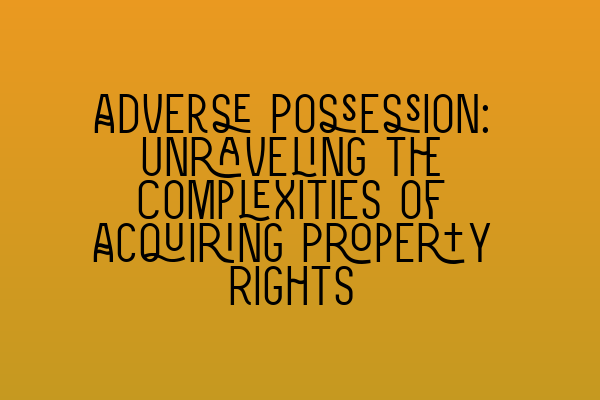Adverse Possession: Unraveling the Complexities of Acquiring Property Rights
Introduction:
Welcome to our blog at SQE Property Law & Land Law. In this article, we will dive into the complex world of adverse possession, a fascinating legal concept that allows individuals to acquire property rights through continuous and uninterrupted possession of land. Whether you are a legal professional, a property owner, or simply curious about property law, this article will provide you with a comprehensive understanding of adverse possession and its intricacies.
What is Adverse Possession?
Adverse possession is a legal doctrine that allows an individual to gain ownership of someone else’s property by continuously possessing it for a specified period of time. This doctrine originated from the idea that a person should not be allowed to sit idly by and neglect their property while another person actively and openly uses the land.
The Requirements for Adverse Possession:
To successfully claim adverse possession, certain requirements must be met:
1. Open and Notorious Possession: The possession of the property must be open and obvious to anyone who visits. It should not be concealed or hidden in any way. This requirement ensures that the true owner of the property has the opportunity to question or challenge the possession if they become aware of it.
2. Actual Possession: The adverse possessor must physically possess the property, demonstrating control and use of the land as if they were the actual owner. Mere intentions or verbal claims are not sufficient to establish adverse possession.
3. Exclusive Possession: The adverse possessor must possess the property exclusively, without sharing possession with the true owner or anyone else. Joint possession or shared use of the land will not satisfy this requirement.
4. Continuous Possession: The adverse possession must be continuous for a specific period of time, which varies depending on the jurisdiction. In some jurisdictions, it could be as short as a few years, while in others, it could be as long as 20 years.
5. Hostile Possession: The possession must be hostile, meaning it is without the permission or consent of the true owner. This does not necessarily imply ill intent; it simply means that the adverse possessor is asserting their right to possess the property without the knowledge or agreement of the owner.
Understanding the Complexity of Adverse Possession:
Although the concept of adverse possession may seem straightforward, its application can be complex. Various legal factors and considerations come into play, making it crucial to consult with an experienced property law solicitor to navigate this area effectively.
Challenges in Adverse Possession Cases:
Adverse possession cases can be fraught with challenges, often due to the difficulty in satisfying all the necessary requirements. The true owner of the property may dispute the adverse possessor’s claim, leading to a legal battle to determine the rightful ownership. In such cases, it is important to gather as much evidence as possible to support the adverse possession claim, including documentation, witness statements, and surveys.
Statutory Time Periods:
Each jurisdiction has its own statutory time period within which adverse possession can be claimed. It is essential to understand and adhere to these time limits to ensure a valid claim. If the required time period is not met, the claim for adverse possession may fail.
Consulting a Property Law Solicitor:
Given the complexities involved in adverse possession cases, it is highly recommended to seek the assistance of a qualified property law solicitor. At SQE Property Law & Land Law, our team of experienced solicitors specializes in property law matters, including adverse possession. We can guide you through the entire process, ensuring that your rights are protected and your claim stands the best chance of success.
Conclusion:
Adverse possession is a complex legal concept that allows individuals to acquire property rights through continuous and uninterrupted possession of land. Understanding the requirements and intricacies of adverse possession is crucial to successfully claiming ownership of a property. As such, it is vital to consult with a knowledgeable property law solicitor to navigate this area effectively.
If you are interested in further preparing for the SQE exams or want to explore other related topics, be sure to check out our related articles:
– SQE 1 Practice Exam Questions
– SQE 1 Practice Mocks FLK1 FLK2
– SQE 2 Preparation Courses
– SQE 1 Preparation Courses
– SRA SQE Exam Dates
At SQE Property Law & Land Law, we are passionate about providing expert legal advice and guidance. Contact us today to discuss your property law needs and find the best solution for your situation.
